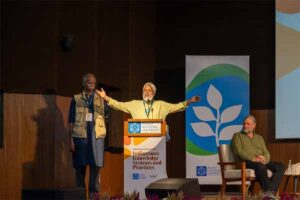- 56 delegates from 18 countries spread over 5 continents take part in two international events promoting Indigenous Knowledge Systems & Sustainable Future
- We have to find local solutions for issues like climate change, pollution, water scarcity and create a clean, green environment: Water Man of India
- These events provide young minds with a deeper understanding of sustainability, culture and design, inspiring them to explore solutions rooted in traditions while embracing modern advancements: Dr Anunaya Chaubey, Provost, Anant National University
NE EDUCATION BUREAU
AHMEDABAD, FEB 22
In order to prepare and empower the next generation of problem solvers and create job-providers to churn out the industry-ready workforce, we urge the policymakers to include the design course in the higher secondary school syllabus. Along with arts, commerce, humanities and STEM (Science, Engineering, Technology and Mathematics), the design course as an option will attract the best brains in this emerging sector, said Dr Anunaya Chaubey, Provost, Anant National University here on Friday.

He said this while hosting two landmark international events: “The International Conference on Indigenous Knowledge Systems and Practices: Designing Sustainable Futures” which brought together global voices, highlighting the importance of integrating Indigenous knowledge into contemporary practices. The 3rd edition of WITH Festival, themed ‘Borderless – Global Indigenous Futures,’ celebrated Indigenous storytelling through contemporary media, simultaneously taking place in Quito (Ecuador), Miami (USA) and São Paulo (Brazil), with Anant hosting its Indian edition.

The conference, led by Dr Anunaya Chaubey, Provost, Anant National University and ‘Water Man of India’ Dr Rajendra Singh, Professor of Practice, Anant National University, featured keynote addresses by Prof Sonajharia Minz and Prof Rishi Narain Singh, alongside research presentations from global experts. It provided a platform for thought leaders, policymakers and scholars to engage in meaningful discussions on sustainable solutions in response to escalating environmental challenges, social inequalities and economic instability.
Anant, the exclusive host of WITH 2025 in India, curated diverse performances during the 2-day festival. These included musical and theatrical performances, poetry recitals and storytelling sessions by artists dedicated to promoting and conserving Indigenous knowledge.
From Kashmiri folk artists performing traditional Kashmiri play, skateboarder-rapper from Madhya Pradesh sharing her pathbreaking journey to a rock-fusion band from Meghalaya narrating Khasi stories and artists from Majuli, Assam, showcasing their unique talent, the performances captured the audiences with their uniqueness.
Talking about the events, Dr Anunaya Chaubey, Provost, Anant National University, shared, “At Anant, we believe that Indigenous knowledge holds timeless wisdom for building a sustainable future. Hosting these events allows us to bring global voices together, fostering dialogue between tradition and contemporary innovation. These events provide young minds with a deeper understanding of sustainability, culture and design, inspiring them to explore solutions rooted in traditions while embracing modern advancements.”
‘Water Man of India’ Dr Rajendra Singh, said, “It is deplorable that 72 percent of ground water has already been depleted in the country. In the Financial Capital of the country, Mumbai, five rivers have vanished. Pollution is at its worst in places where highly educated people reside viz New Delhi, Mumbai, including Ahmedabad. In the desert region of Rajasthan, the dreaded dacoits of Chambal have dropped their guns and turn to farming as they get water for farming. All this has been made possible by adopting the Indian indigenous knowledge system in a scientifically proven way with community support. Anant faculty and students have visited Alwar and Chambal to get hands-on experience of these transformation. This has boosted their confidence in our traditional knowledge. Now, they are gearing up to find efficacious solutions to the big problems being faced by our society. In a nutshell, we have to find local solutions for issues like climate change, pollution, water scarcity and create a clean, green environment.”
Nubia Rodriguez from Mexico, Tirtho Bhuyan and Jadab Borah from Uttar Kalambari Satra, in Majuli, a river island in Assam, also spoke at the event.
56 delegates from 18 countries spread over 5 continents are taking part in two international events promoting Indigenous Knowledge Systems & Sustainable Future.












